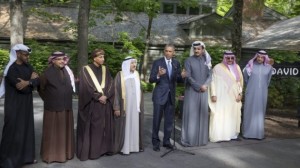Newspaper Article 04/07/2015

In May, 2015 President Obama hosted GCC leaders at Camp David. In the past, under Jimmy Carter and Bill Clinton, summits at Camp David had symbolic understanding of a step towards ‘ U.S Middle East peace- making efforts’. This time also the summit was convened to convince the Gulf allies to not to worry about the U. S- Iran nuclear deal and to reconcile their long- term regional partnership with the U. S. However, before the commencement of the summit, analysts refuted the likeliness of any positive development. Hopes were minified when only two heads of state from Kuwait and Qatar came to attend the sixnation Gulf summit. Other states were represented by their top- level officials only. This proved to be a first public display of growing rift between Washington and the GCC.
Two main factors that have created this rift include US’s reluctance to stand by the Gulf States during Syria crisis and particularly, GCC is outraged by the often occurring meetings between John Kerry and Javad Zarif ( Iran’s Minister of Foreign Affairs) that express America’s foreign policy priorities. The rift was probably broadened when President Obama in the closing session of the Summit gave a clear message of keeping historic chance of breakthrough in nuclear talks with Iran above GCC’s comfort. He stated, “I want to be very clear: The purpose of any strategic cooperation is not to perpetuate any long- term confrontation with Iran, or to even marginalize Iran.”
In recent years, this is not the first time U. S has ignored an issue that is of concern for the Gulf States. Due to such responses, analysts have inferred that U. S is pursuing policy of retreat and retrenchment in the Middle East. But then the way Washington has for the last two decades remained militarily and politically heavily reliant on the Gulf monarchies, these states appear to be unready to accept U. S engagement with Iran as a payoff of their favour. That’s why despite numerous guarantees by Washington, GCC’s fundamental distrust with US Administration doesn’t seem to have changed.
It is required to comprehend that GCC concerns were never about the Iranian nuclear program. They are against Iran’s acquisition of nuclear weapon, not out of fear that Iran would ever use a nuclear bomb against them rather it’s the prestige and influence Iran would gain that worries them. The issues of concern to GCC states are the political influence, Iranian meddling in domestic Arab affairs, and conventional capacities and resources that may further facilitate this meddling. Might be as a tactical manoeuvre President Obama is trying to buy himself time, thus he is simply applying half- measures particularly in Syria and Iraq. But leaving the chaotic situation unresolved for his successor does not seem to be a viable option. President Obama will not likely be able to ignore developments such as the Islamic State ( ISIS) knocking at the gates of Baghdad. President Obama may have sensed the burden of US share in Middle East’s terrible situation that’s why sign of constructive engagement was agreed upon by US and GCC at the Camp David summit was “cooperation in countering Iran’s destabilizing activities in the region and continuing consultations on how to enhance the region’s security architecture.” Quite significantly, one of the agreements reached at the summit was to jointly develop a region- wide ballistic missile defence capability and a ballistic missile early warning system. Despite the fact that several GCC states have necessary defence components already installed, for example short- range Patriot systems in Saudi Arabia and THAAD systems in Qatar. However, this new defence installation would sanction short to long- range missile defence. It is vital development considering GCC’s decision reached in late 2014, to create a unified military command ( often labelled as an Arab NATO).
Seeing the complex situation in the Middle Eastand the curvy road taken by U. S- GCC ties, categorically nothing can be said as final about U. S policy. Presently Washington is perhaps more engaged in management of conflicts and not their resolutions. Apparently, a deal with Iran at this point of time is not likely to be reached. Congressional support remains ambiguous. Moreover, the deal is unlikely to be welcomed by Israel and the GCC states a sit cannot be overlooked that Iran would emerge stronger by using the deal as an international opening to strengthen its economy and bolster its influence which will disturb these states to an extent that they may look towards other options to build stronger regional alliance.
Published by Pakistan Observer on June 6, 2015
Link of the Article: http://www.pressreader.com/pakistan/pakistan-observer/20150606/281728383132892/TextView
Disclaimer: Views expressed are of the writer and are no necessarily reflective of IPRI policy.

